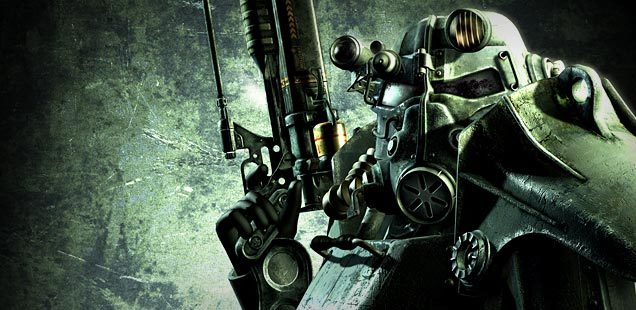Bethesda Studios’ new RPG may have its weaknesses, but it all adds up to a flawed masterpiece we’re happy to class as a “must-buy”.
I encountered Black Isles’ PC game Fallout in 1998, a year after its release and in the same year as that of its sequel, Fallout 2. A friend recommended the game to me based on my enjoyment of the studio’s fantasy RPG, Baldur’s Gate.Fallout’s originsBaldur’s Gate was steeped in 30 years’ worth of Gary Gygax’s dice-rolling, kobold-slaying D&D joy, which lit up my early teenage years. Fallout leaned more towards high camp, 1950s, doo-wop space opera, and I revelled in it.
The game was BB guns, Elvis portraits, MADD magazine, alien abductions, cold war paranoia and alternate universes. Loneliness played a big part in the experience: the consequences of the player character’s choices seemed starker in a depopulated world. And the choices were plenty. I played through the first game several times, to breathe in as much of it as I could.
The isometric interface was ugly, terribly so, even for that time. The first Half Life demo was out before Fallout 2, dating the game’s mechanics like electricity overtook gaslight. Despite this, the game would develop a cult that followed any news of a further sequel with revolutionary zeal. Early developments ran parallel to the pre-2000 forum boom. Games culture went over ground, with its trolls and l33t speak. Black Isle went to ground, like their vault dwelling protagonists.Sequel cultureOur culture attempts to immediately replicate things that we enjoy, almost immediately. Films, books and TV shows have had this tendency for as long as they have been around, and video games are catching up. Because of their connection to and reliance on rapidly accelerating technology, they have an in-built capacity for refinement or reduction, with an almost genetic knack. This is either its greatest strength or weakness.
Where my first experiences of Fallout were spent on a self-built 366 running at 40Mhz, I had the good fortune to play Fallout 3 on Xbox 360. This is one of those occasions where a video game is refined, perfectly matching the march of time.Fallout 3Bethesda Studios took control of the franchise after Interplay sold its IP, during lean times for the publisher. The game was afoot for a third Fallout and thousands of dedicated fans waited keenly for its October release. I found it a triumph in some ways, a disappointment in others.
After a 50s-style atomic warfare between China and the US, the surviving peoples — or vault dwellers — emerge blinking from their holes into an inhospitable and mutated North America. The player character is tasked with investigating his/her father’s disappearance from their protective vault. The story follows the hunt and its aftermath, across the many real-world kilometres of a bomb-scarred Washington D.C.
I decided not to judge the game based on its looks. As a large game, Fallout 3 had been in development for longer than other games during that time which had more of a graphical sheen. I thought that the palette was a little dry in some areas but the overall atmosphere is aided by the design. I would like to concentrate on the game’s core mechanic.
As games players today expect action/shooter games to take place from the first or third person, Bethesda judged it best to abandon Fallout’s turn-based approach with its isometric perspective. I’m not sure if this ruins the game’s immersive authenticity, as there is a nod to turn-based play by its bastard cousin, Vault-Tec Assisted Targeting System, or V.A.T.S. This is where I have major qualms.
Since Gygax romanced the world with his dungeons and dragons, Sakaguchi’s Final Fantasy weaned adolescents from their inhalers, and Eye of the Beholder led to the first time I heard my older brother swear, gaming has been about turns and twitching.
Twitching brought us beat-em-ups, bullet hell games and Daley Thompson’s Olympics. Turns gave us levelling up, inventories, strategy and maps on your bedroom wall. V.A.T.S. attempts to straddle the two and awkwardly, as it turns out. The player can still bring up all the potions, weapons and levelling points while the game is paused, but it feels like cheating.
Where before, D&D games were face-melting, insanely hard hurt lockers which actively punished the foolhardy, the V.A.T.S pause and shoot mechanic allows for finessed head shots and superhuman feats of staying alive for long periods. There is some pleasure in gliding through the world in slow motion, acting out Mad Max gunplay fantasies, but there is grit missing. Things are not deadly enough, even at higher difficulties: the stakes are too low.
Summary — A must-buy: for newcomers an unequalled delight, a flawed masterpiece for seasoned campaigners.
Weaker: Elder Scrolls IV: OblivionStronger: Wasteland
